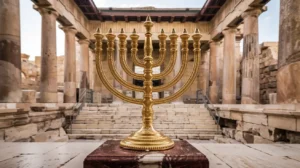In biblical times, gold held a significance that transcended mere material wealth and religion. Its value was intertwined with spiritual, religious, and cultural aspects, shaping the ancient world in ways that continue to resonate today.
Exploring the role of gold in biblical times unveils a stark contrast between its symbolic importance and practical applications in religion, spirituality, and spiritual wealth.
From adorning sacred artifacts to symbolizing purity and divine presence, gold’s prominence in religious texts and historical accounts offers a captivating glimpse into the intersection of faith, power, and opulence and spirituality.
Join us as we delve into the multifaceted significance of gold in biblical times, uncovering its enduring legacy, profound impact on ancient civilizations, and spiritual presence.
Key Takeaways about Gold in Biblical Times
- Gold Holds Spiritual Significance: The use of gold in biblical times was not merely for its material value but also for its spiritual symbolism, representing purity, divinity, and the presence of God.
- Biblical References Reflect Symbolism: The numerous references to gold in the Bible, such as the golden calf and the streets of heaven being paved with gold, serve as powerful symbols of faith, wealth, and divine glory.
- Understanding Modern Perspectives: Exploring the historical and spiritual significance of gold in biblical times can provide valuable insights into its enduring symbolism and relevance in modern religious and cultural contexts.
- Appreciating the Symbolism: By recognizing the symbolic significance of gold in biblical narratives, individuals can deepen their understanding of religious teachings and draw inspiration for their spiritual journeys.
- Incorporating Symbolism into Daily Life: Reflecting on the symbolism of gold in biblical times can encourage individuals to integrate spiritual values and principles into their everyday lives, fostering a deeper connection to their faith and beliefs.
- Applying Spiritual Insights: Drawing parallels between the spiritual significance of gold in biblical times and contemporary life can inspire individuals to embody virtues such as purity, integrity, and reverence in their actions and interactions.
Gold in Biblical Context
Symbolic Meanings
In biblical times, gold held significant symbolic meanings. It was associated with purity, righteousness, and divine presence. The use of gold in religious artifacts and structures signified the sacredness and holiness of God’s dwelling place on earth. The precious metal symbolized spiritual concepts such as faith, love, and eternal values. Moreover, gold was employed in the construction of the Ark of the Covenant, emphasizing its representation of divine glory and holiness.
Divine Connections
Gold in biblical contexts was deeply connected to divine presence. It was used to signify the divine nature and the manifestation of God’s power among His people. In the Bible, gold is often linked to the presence of God, depicting His majesty and sovereignty. For instance, the golden lampstand in the Tabernacle represented God’s continuous presence and guidance for His people. The use of gold in religious ceremonies reinforced the belief in a direct connection between humans and the divine.
Wealth and Royalty
In biblical narratives, gold was closely associated with wealth and royalty. It symbolized abundance, prosperity, and opulence. The possession of gold was considered a reflection of one’s status and influence in society. For example, King Solomon’s wealth was highlighted through his extensive use of gold in constructing the Temple in Jerusalem. The opulent decorations and furnishings made of gold reflected his authority and magnificence as a ruler. Furthermore, biblical accounts often portrayed gold as a precious commodity gifted to kings, further solidifying its association with royalty and affluence.
Symbolic Meanings | Divine Connections | Wealth and Royalty |
|---|---|---|
purity | divine nature | abundance |
righteousness | manifestation | prosperity |
holiness | God’s presence | opulence |
spiritual concepts | majesty | status |
faith | sovereignty | influence |
love | guidance | authority |
eternal values | direct connection | magnificence |
precious commodity |
Gold in Abrahamic Religions
Judaism Significance
Gold holds a significant role in Jewish traditions and practices. In Judaism, gold is considered a symbol of purity, prosperity, and divine presence. It is often used in the construction of sacred objects and structures, such as the Ark of the Covenant and the menorah. The use of gold in these religious artifacts signifies the importance of holiness and reverence in Jewish culture. The intricate craftsmanship and embellishment with gold reflect the high regard for spiritual significance within Judaism.
Christianity Role
Gold plays a crucial role in Christian theology and beliefs. In Christianity, gold symbolizes divinity, glory, and eternal life. It is prominently featured in religious art, including paintings, sculptures, and architecture. The use of gold leaf or gilding in Christian iconography represents the heavenly realm and the purity of God’s kingdom. Moreover, the gift of gold to baby Jesus by the Magi is an essential part of the Nativity story, signifying honor and recognition of Jesus’ royal status as the King of Kings.
Islam Teachings
The teachings of Islam emphasize the significance of gold within its cultural and religious practices. In Islam, gold holds symbolic meanings of purity, wealth, and luxury. Islamic art and architecture often incorporate intricate designs embellished with gold, portraying opulence and spiritual grandeur. Furthermore, Islamic traditions dictate specific guidelines regarding the use of gold jewelry and ornaments, highlighting its value as a form of adornment while emphasizing modesty and humility in personal conduct.
Religion | Significance of Gold |
|---|---|
Judaism | Symbol of purity, prosperity, and divine presence. Used in the construction of sacred objects and structures. Signifies holiness and reverence in Jewish culture. |
Christianity | Symbolizes divinity, glory, and eternal life. Featured in religious art, representing the heavenly realm and the purity of God’s kingdom. Gift of gold to baby Jesus signifies honor and recognition of Jesus’ royal status. |
Islam | Symbolic meanings of purity, wealth, and luxury. Incorporated in Islamic art and architecture, portraying opulence and spiritual grandeur. Specific guidelines regarding the use of gold jewelry and ornaments, emphasizing its value as a form of adornment while highlighting modesty and humility in personal conduct. |
Spiritual Significance of Gold
Wisdom and Blessings
Gold holds profound spiritual significance in biblical times, symbolizing wisdom, purity, and blessings. In the Old Testament, gold is often associated with divine wisdom and knowledge. For instance, the wisdom of King Solomon was exemplified through his immense wealth in gold, signifying divine favor and understanding. The biblical narrative portrays gold as a representation of God’s blessings upon His people.
The Book of Proverbs emphasizes the value of wisdom and compares it to gold, highlighting its incomparable worth. This analogy underscores the spiritual importance of wisdom and the parallel drawn between gold and divine insight. Moreover, the concept of blessings is intricately tied to gold in biblical teachings. The idea of abundant blessings from God is often symbolized by the imagery of gold, portraying prosperity and divine favor bestowed upon individuals and communities.
Gold in Biblical Times | Spiritual Significance |
|---|---|
Symbolized wisdom, purity, and blessings | Associated with divine wisdom and knowledge |
Exemplified through King Solomon’s immense wealth | Represents God’s blessings upon His people |
Emphasized as incomparable worth, like wisdom | Tied to the concept of abundant blessings from God |
Sacred Uses
Gold’s sacred uses in religious ceremonies and rituals are deeply rooted in biblical traditions. In the construction of the Tabernacle and later the Temple in Jerusalem, gold played a central role in adorning sacred objects and artifacts. The Ark of the Covenant, menorah, and various vessels used in worship were crafted from pure gold, signifying their sacred nature and symbolic connection to the divine.
Furthermore, the use of gold in religious contexts represents purity and holiness. It serves as a medium for conveying reverence and sanctity during religious observances. The intricate craftsmanship involved in creating golden artifacts reflects the meticulous care taken to honor God through these sacred items. The presence of gold in religious settings conveys a sense of awe and reverence, underscoring its profound spiritual significance.
- Gold plays a central role in adorning sacred objects and artifacts in religious ceremonies and rituals
- The use of gold in religious contexts represents purity and holiness
- Gold serves as a medium for conveying reverence and sanctity during religious observances
- The intricate craftsmanship involved in creating golden artifacts reflects the meticulous care taken to honor God through these sacred items
- The presence of gold in religious settings conveys a sense of awe and reverence, underscoring its profound spiritual significance
Biblical References to Gold
The Golden Calf
The story of the Golden Calf in the Bible, found in the book of Exodus, portrays a significant event where the Israelites, impatient during Moses’ absence, crafted an idol out of gold. This act of idolatry symbolized the people’s wavering faith and disobedience to God. The consequences were severe, as it led to divine punishment and loss of many lives. The narrative serves as a stark reminder of the dangers of worshiping false gods and the repercussions of straying from spiritual truths.
Reflecting on this biblical account, one can derive moral lessons about the perils of succumbing to material desires and forsaking spiritual values. It emphasizes the importance of remaining steadfast in faith and resisting temptations that lead away from righteousness. The story also underscores the significance of genuine devotion and unwavering belief in higher principles.
Magi’s Gift to Jesus
The Magi’s gift of gold to baby Jesus holds profound symbolic meanings. Gold, a precious metal associated with wealth and royalty, was presented to honor Jesus’ divine kingship. The offering signified recognition of Jesus as the King of Kings and highlighted his sovereignty over all earthly riches. This act conveyed reverence and adoration for the infant Jesus, acknowledging his divine nature and authority.
Delving into the spiritual implications, the gift of gold exemplifies the acknowledgment of Jesus’ supreme reign over all aspects of life. It represents the recognition of his unparalleled significance and serves as a testament to his role as the ultimate source of salvation and grace. The Magi’s act encapsulates the essence of honoring and glorifying Jesus as the divine ruler, emphasizing his unmatched position in human history.
- Gold symbolizes wealth and royalty
- Represents recognition of Jesus as the King of Kings
- Signifies Jesus’ sovereignty over earthly riches
- Conveys reverence and adoration for Jesus
- Acknowledges Jesus’ divine nature and authority
- Exemplifies acknowledgment of Jesus’ supreme reign
- Represents recognition of his unparalleled significance
- Testament to his role as the ultimate source of salvation and grace
- Emphasizes Jesus as the divine ruler with unmatched position in human history
Temple Finery
Gold played a prominent role in adorning temples and sacred spaces during biblical times. The intricate details of temple finery made of gold reflected opulence and reverence for divine presence. Adorning temples with gold demonstrated utmost respect for spiritual sanctity and emphasized the exalted nature of religious rituals.
Exploring further, the cultural and religious significance of embellishing temples with gold underscored the belief in glorifying divine entities through grandeur and magnificence. It symbolized devotion, purity, and transcendence beyond worldly realms, signifying an elevated connection between humanity and the divine.
Aspect | Temple Finery |
|---|---|
Material | Gold |
Purpose | Adorning temples and sacred spaces |
Significance | Reflection of opulence and reverence for divine presence |
Symbolism | Devotion, purity, and transcendence |
Cultural and Religious Significance | Glorifying divine entities through grandeur and magnificence |
Connection | Elevated connection between humanity and the divine |
Symbolism in Scriptures
Divine Creation
Gold, a symbol of divine beauty, has been mentioned in biblical scriptures. Its creation is attributed to the divine. The Bible describes gold as a precious metal formed by God. The natural allure of gold reflects the divine craftsmanship.
The spiritual significance of gold is deeply rooted in its creation by God. It symbolizes purity, perfection, and the divine connection with the material world. The intricate details of gold’s formation showcase the divine artistry.
Dreams Interpretation
In biblical texts, dreams involving gold carry significant symbolic meaning. Gold represents purity, holiness, and the presence of God in dream interpretations. It signifies spiritual wealth, divine blessings, and eternal values.
The symbolism of gold in dreams holds prophetic significance. It often signifies spiritual enlightenment, divine revelation, and God’s favor upon an individual. Gold in dreams and visions is a powerful symbol of God’s presence and guidance.
Modern Perspectives on Gold
Spiritual vs Material Value
Gold holds dual significance as both a material and spiritual entity. In biblical times, gold symbolized wealth and prosperity. However, its spiritual value was equally significant, representing purity and divine presence. The contrast between the material and spiritual value of gold continues to resonate in modern society.
The allure of gold as a physical commodity is evident in its widespread use in jewelry, electronics, and dentistry. Conversely, its spiritual symbolism endures through religious artifacts and ceremonial objects. This duality underscores the timeless appeal of gold, bridging the gap between material wealth and spiritual richness.
Precious Metals Today
In contemporary society, precious metals like gold retain their cultural and economic significance. Gold serves as a store of value, offering stability in times of economic uncertainty. It continues to be used for investment purposes and as a hedge against inflation, reflecting its enduring economic relevance.
Moreover, gold’s cultural value persists through its association with luxury and prestige. From high-end jewelry to prestigious awards, gold remains a symbol of opulence and distinction. Its aesthetic appeal and rarity contribute to its continued desirability in today’s world.
Final Remarks
You’ve delved into the rich history and profound symbolism of gold in biblical times, gaining a deeper understanding of its significance in Abrahamic religions and spiritual contexts. From adorning sacred objects to representing purity and divine presence, gold holds a revered place in the scriptures, offering timeless lessons and insights. As you reflect on the enduring symbolism of gold, consider how its spiritual significance can inspire reverence and awe in your own life.
Explore how the spiritual symbolism of gold can enrich your perspective and guide your actions. Whether through embracing purity and integrity or recognizing the divine presence in everyday moments, the enduring symbolism of gold offers profound wisdom for navigating life’s journey with grace and purpose.
Frequently Asked Questions about Gold in Biblical Times
What is the significance of gold in biblical times?
Gold held significant value in biblical times, symbolizing wealth, purity, and divine presence. It was used in religious artifacts and represented God’s glory and power.
Are there specific references to gold in the Bible?
Yes, the Bible contains numerous references to gold, including descriptions of its abundance in ancient times and its use in adorning sacred objects and places of worship.
How is gold viewed in Abrahamic religions?
Gold is revered in Abrahamic religions as a symbol of purity, divinity, and prosperity. It is often associated with the divine presence and used in religious ceremonies and decorations.
What is the spiritual significance of gold according to biblical teachings?
In biblical teachings, gold is spiritually significant as it represents faith, righteousness, and eternal value. It symbolizes God’s unchanging nature and serves as a metaphor for spiritual refinement.
How do modern perspectives view the importance of gold in biblical contexts?
Modern perspectives recognize the enduring significance of gold in biblical contexts, acknowledging its historical, cultural, and religious importance while also valuing its symbolic and material worth.
Related Blog Posts
Explore the Golden City of Jerusalem: Holy Land’s Gem
Discover the wonders of The Golden City of Jerusalem, a sacred destination where ancient history, sp…
Read MoreThe Temple of Herod: Ancient Jewish Landmark
Explore the grandeur of The Temple of Herod, a monumental ancient Jewish landmark. Discover its hist…
Read MoreGold in the Tabernacle: Significance and Symbolism
Discover the sacred significance of gold in the Tabernacle, its symbolic meaning, and role in ancien…
Read MoreThe Golden Calf: Biblical Story of Idolatry
Explore the biblical account of the Golden Calf, a pivotal moment in Exodus showcasing idolatry and …
Read MoreGold in Solomon’s Temple
Explore the fascinating history of gold in Solomon's Temple. Discover its significance, quantity, an…
Read MoreThe Ark of the Covenant: Ancient Biblical Relic
Explore the mysteries of the Ark of the Covenant, a sacred biblical artifact central to ancient Isra…
Read MoreThe Golden Altar of Incense: Understanding its Significance
Discover the significance of the golden altar of incense and its role in worship. Learn about its lo…
Read MoreExternal Sources







